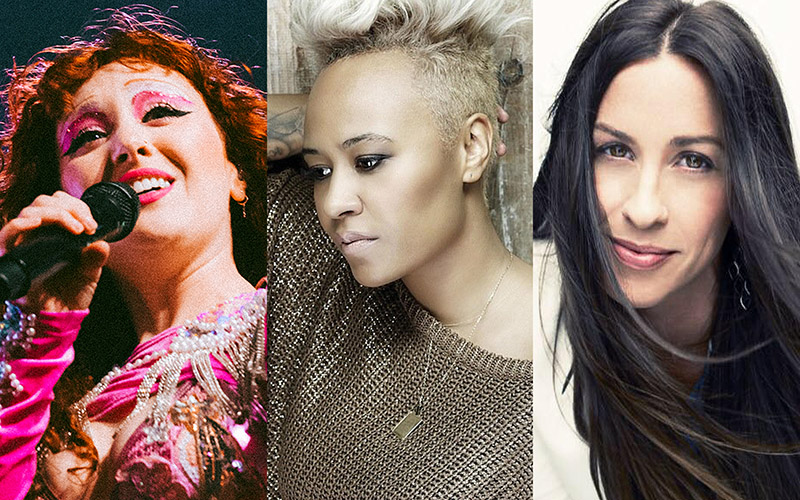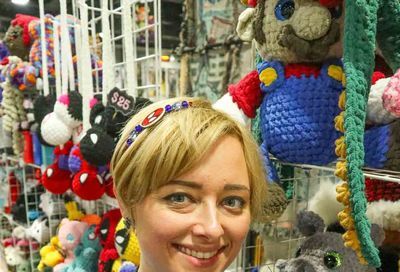Tyler Perry: Madea is an LGBTQ ally, “as am I”
Tyler Perry shares the inspiration behind including a gay character in his newest Madea film, now on Netflix

Tyler Perry has paved his own lane in film, television, and theater, and on that lane he’s built his own 330-acre studio, reportedly the largest film production studio in the U.S. It’s no exaggeration to say that the mogul owes much of that phenomenal success to the enduring appeal of his most famous creation: Mabel Earline Simmons, the tough-talking, gun-toting grandma better known as Madea.
Introduced in Perry’s 1999 stage play I Can Do Bad All By Myself, and portrayed by Perry in full wig, makeup, housedress, and padded body-ody-ody, Madea made her leap to the big screen in the 2005 hit Diary of a Mad Black Woman, based on Perry’s play. Since then, Madea’s movies have generated more than half a billion dollars in domestic box office, establishing the character as a star in her own right.
Labeled by some a stereotype of Black womanhood, and criticized as a modern minstrelsy act, Madea undeniably speaks to an audience that has supported her — and Perry — across a range of sequels, spinoffs, and TV series.
Named one of Time‘s 100 Most Influential People in 2020, Perry clearly ascertains and appreciates the power that Madea wields as a cultural influencer. He didn’t become a billionaire by not understanding the concerns of his predominantly Black, predominantly female audience. Yet, while he’s used the character and her comically vast extended family to address crucial issues, from religion and racism to sexual harassment, Perry has conspicuously left one topic off the table — until now.
With Netflix’s A Madea Homecoming, the franchise introduces its first gay lead character, Madea’s great-grandson Tim, portrayed by gay actor Brandon Black (Dear White People). In the film, Madea and family are set to celebrate Tim’s college graduation with plenty of pomp and circumstance when the revels are struck by a series of bombshell revelations. The movie doesn’t stray from the franchise’s formula of broad comedy mixed with soapy melodrama, but Perry apparently took very seriously this opportunity to depict a coming-out story that would matter to his audience.
On a recent Zoom call, Perry, who also co-stars in Netflix’s current Oscar nominee Don’t Look Up, shared with Metro Weekly why he felt it important to include an LGBTQ storyline in Homecoming. And he clarifies his take on whether Madea — one of several characters, male and female, that Perry dons wigs and makeup to play in the films — is or isn’t drag.

METRO WEEKLY: This is the ninth Madea movie — the 13th that she’s appeared in, if we’re counting animated comedy Tough Love — but the first to feature an openly gay character with their own storyline and certainly a coming out storyline. Why this inclusion, and why now?
TYLER PERRY: Well, for me, I’ve been doing work for years with the Covenant House, and a lot of those kids were finding themselves homeless when they would come out. And I just wanted to speak to people embracing people for who they are. And I thought, especially as African-American people, we kind of lag behind in our response to things. The way that a lot of families treat LGBTQ kids really bothered me a great deal. I wanted to show this iconic character that I have, Madea, embracing her great-grandson. And I’m hoping that sends a message around the world to anybody who has a gay person in their family that it’s all, you know, people are people.
MW: The reaction of the family in the film indicates that these conversations are not necessarily as difficult to have as we might think, if you go into them with love. Do you hope that people behave that way? Or do you think that reflects how people are actually getting along now?
PERRY: A lot of people in my audience can be very influenced by what I say and what I do. So to have this character that they love so much to be so open and so loving and so kind, just sends a clear message of, “Clearly, this is okay, right? This wasn’t a choice for him. This is who he is, and love is love.” So that’s what was important for me.
MW: Would you consider Madea an ally of the LGBTQ community?
PERRY: Oh, 100 percent. Yeah, 100 percent. Absolutely. As am I, and have always been.
MW: Do you feel your allyship is visible in your work?
PERRY: You know what I’ve tried to do over the years — even when I was thinking about The Haves and Have Nots, when Jeffrey [portrayed by Gavin Houston] was coming out, and his mother was so hateful and resentful in the things she was saying to him, or even him being in love with his straight best friend at that time — is introduce it slowly to my audience so that I could get to this place where I am now, where Madea is accepting and wrapping her arms around it.
I remember that scene where [Jeffrey’s mother] is going off on him for being gay and she’s saying some horrible things to him. And in his performance, he’s in tears, telling her that he is a man. He is a gay man, right? It was such a powerful moment. I have someone who works for me whose mother saw it, and who had treated him really badly because he’s gay, and she calls him up and she said, “I am not that woman and I’m going to treat you better.” So that’s the whole purpose of what I’ve tried to do.
MW: Where do you feel the Madea character and your portrayal of Madea falls on the drag spectrum, like from Flip Wilson to RuPaul?
PERRY: For me, I approach it from the sense of just, when I’m playing Joe, I’m putting on an old man’s costume. When I’m in Don’t Look Up and I’m a news reporter and I’ve got the toupee and the beard, I approach it all the same way. It is a costume where I’m becoming a character, and as an actor, I just embody the character fully, whatever that means. If people want to think it’s drag or call it drag, I don’t care, doesn’t matter to me. It is what it is. I’m just fully embodying the character as what they are.
A Madea Homecoming is streaming starting Friday, Feb. 25 on Netflix. Visit www.netflix.com. Follow Tyler Perry on Twitter at @tylerperry.
Support Metro Weekly’s Journalism
These are challenging times for news organizations. And yet it’s crucial we stay active and provide vital resources and information to both our local readers and the world. So won’t you please take a moment and consider supporting Metro Weekly with a membership? For as little as $5 a month, you can help ensure Metro Weekly magazine and MetroWeekly.com remain free, viable resources as we provide the best, most diverse, culturally-resonant LGBTQ coverage in both the D.C. region and around the world. Memberships come with exclusive perks and discounts, your own personal digital delivery of each week’s magazine (and an archive), access to our Member's Lounge when it launches this fall, and exclusive members-only items like Metro Weekly Membership Mugs and Tote Bags! Check out all our membership levels here and please join us today!

























You must be logged in to post a comment.